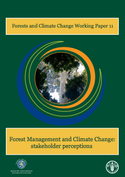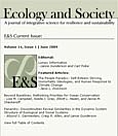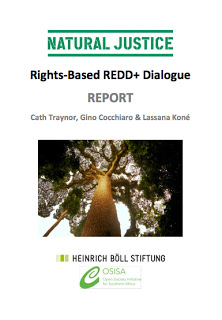Brazil: Munduruku chief clarifies REDD contract with celestial green ventures, calls it a ‘tale’It created waves of headlines around the world when the Munduruku, an indigenous nation of approximately 13,000 living in the state of Para, Brazil, signed a carbon credit sales contract (REDD) with Celestial Green Ventures.
|
British Columbia makes regulatory change allowing the removal of private land from woodlot licencesBritish Columbia has made an amendment to section 47.1 of their Forest Act that will allow private land to be removed from a woodlot.
|
Indigenous developed forest protection planWapichan communities of Guyana, presented a proposal to the government of that country to give them the care of 1.4 million hectares of native forests. Its aim is to preserve and protect that area of industries that could threaten its
|
Brazil is a Model for the Rights of Forest Communities In 2002, 85 percent of the planet’s forests were owned by governments.
|
Public consultation launched for draft ‘Guidelines for the use of REDD+ SES at country level Version 2′REDD+ Social & Environmental Standards launched its public consultation on draft ‘Guidelines for the use of REDD+ SES at country level Version 2′ from 5th April until 4th June 2012.
|
Putting Free, Prior, And Informed Consent Into Practice In REDD+ InitiativesThe principle that indigenous peoples and local communities have a right to give or withhold their Free, Prior, and Informed Consent (FPIC) to developments affecting natural resources is not new.
|
Logging companies may assist rural development: StudyLogging companies play a key role in developing forest regions in Central Africa, a CIFOR report studying the impact of commercial forest management says.
|
Forest Peoples: Numbers Across the World By providing estimated figures for indigenous and forest peoples’ populations in countries and regions across By providing estimated figures for indigenous and forest peoples’ populations in countries and regions across
|
1.3 billion people rely on forests to survive Hands off our forest! The UN has adopted a series of voluntary guidelines to protect indigenous peoples' rights to the land on which they live.
|
Forest Management and Climate Change: stakeholder perceptions This document is part of the publications series produced by the Forest and Climate Ch This document is part of the publications series produced by the Forest and Climate Ch
|
Research questions REDD Program in Chiapas for Destroying Indigenous IdentityThe program Reducing Emissions from Deforestation and Forest Degradation (REDD Plus), driven by the UN, has been embraced by the government of Mexico since 2010, and its flagship is Chiapas where, as in other countries, the program is controversial.
|
International Law Principles for REDD+: The Rights of Indigenous Peoples and the Legal Obligations of REDD+ ActorsThe REDD+ Principles identify a pathway to implement a human rights-based approach to development within REDD+ initiatives.
|
Analysis of possible indicators to measure impacts of REDD+ on biodiversity and on indigenous and local communitiesThis report has been produced for the Secretariat of the Convention on Biological Diversity (CBD), as part of the activities in response to decision X/33 paragraph 9 (h), in which the Conference of the Parties requested the Executive Secretary to ‘…identify possible indicators to assess the contr
|
Seeing the people for the trees
|
Legal clarity on REDD benefit sharing mechanisms critical to avoid future disputes, says study Legal clarity and consensus on which government institutions have the authority to make regulations on how to share benefits from REDD+ among stakeholders are critical to ensure the process’ legitimacy and avoid future disputes, recommended a study conducted by the Center for International Forest
|
Christian Aid launches document on REDD+REDD+ aims to reduce emissions from forests, prevent deforestation and encourage investment in low-carbon development. Christian Aid’s Latin American and Caribbean partners believe that such projects must be managed by local communities and be truly inclusive.
|
The “Aid-ification” of REDD+: How its changed and why it matters A scheme for reducing global carbon emissions by slowing deforestation in tropical countries has changed drastically and become “aid-ified” since it was first floated in 2005, according to a major new publication on the subject.
|
Global Alliance of Indigenous Peoples and Local Communities on Climate Change against REDD+After more than 500 years of resistance, we, Indigenous Peoples, local communities, peasant farmers, fisherfolk and civil society are not fooled by the so-called Green Economy and REDD+ because we know colonialism when we see it.
|
Growing benefits from forest carbon projects
Corporate responsibility managers should take a look at forest carbon offset projects to maximize return on investment in climate, biodiversity, and community benefits
|
World Bank Forest Investment Programme challenged to respect indigenous peoples' rights in Peru
|
Free, prior and informed consent in REDD+, by Isilda Nhantumbo
“The government took our forest land to create a forest reserve and the same government confiscated our land for planting trees. All that is left is unproductive savannah,” said a community representative speaking during a meeting in the Democratic Republic of Congo.
|
Lao Government Announces Dramatic Shift in Land and Forest policy
|
Forest Peoples Programme: Numbers Across the WorldBy providing estimated figures for indigenous and forest peoples’ populations in countries and regions across the globe, this report seeks to raise awareness of the existence of peoples who primarily depend on forests for their livelihoods, and to enhance their visibility as key actors and rights
|
Laos shares land and forestry management goalsLand and forestry is the primary resource of the nation, and needs to be managed properly in order to improve local people's living conditions and further socio-economic development in Laos.
|
IDB, CI-Guyana sign US$1.6M deal for LCDS implementationTHE Inter-American Development Bank (IDB) and Conservation International-Guyana (CI-Guyana) signed an agreement yesterday, to begin a project that will test models for implementation of this country’s Low Carbon Development S
|
The return of fortress conservation: REDD and the green land grab in the Peruvian AmazonI remember when the park guards first came to our village. They called a meeting and said ‘get your things together and pack your bags, don’t make any new farms and we will see where you can be resettled’.
|
Publication Details - Participatory Social Impact Assessment for Natural Resource Projects and ProgramsThere is a growing realization that good practice Social Impact Assessment (SIA) is an issue of self-interest; it can strengthen social sustainability, reduce investor risks and transaction costs, inform adaptive management, and build stakeholder ownership when undertaken in a participatory way.
|
Wisconsin tribe has much to teach usRe: "Manage forests for the future," Oct. 17.
The editorial correctly observes that B.C.'s public forests must be managed for the future. The Menominee native Americans in Wisconsin are an excellent example of people doing this.
|
Brazil takes action against forest carbon deal in the AmazonBrazil's Attorney General Office has taken legal action against a deal signed between an Irish company and an Amazon indigenous group for the sale of carbon credits from avoided deforestation.
|
Logging concessions and local livelihoods in Cameroon Sustainable forest management gives the opportunity to better integrate the way local populations use thei Sustainable forest management gives the opportunity to better integrate the way local populations use thei
|
Rights-based REDD+ dialogue The outcomes of the Rights-based REDD+ dialogue The outcomes of the Rights-based REDD+ dialogue
|
Bushman children arrested under renewed government repression Three Bushman children have been arrested by paramilitary police in Botswana.
|
Forests' Protection Needs Community Support
|
Globalisation, logging concessions, conservation organisations and local peopleA commonly held view in the developed part of the world is that conservation organisations are doing "good" when offering small-scale development activities to improve local livelihoods of people in remote forested areas, such as those in southeast Cameroon.
|
Land grabs and human rights violations exposed in Liberia ahead of global development summit
|
Trucks arrive to evict Botswana Bushmen despite government denials Government trucks arrived last night to evict Bushmen from their ancestral land in southern Botswana, according to reports received by Survival International.
|
Communities need more than money to stop clearing their forests, new research shows
|
Why Ecuador's president is misleading the world on Yasuni-ITT
|
Rhetoric or action in global efforts to protect forest communities?JOHANNESBURG, 29 October 2013 (IRIN) - A UN mechanism that purports to involve forest-dependent communities in preventing forest loss to curtail greenhouse gas emissions is failing to do so, finds a new study.
|